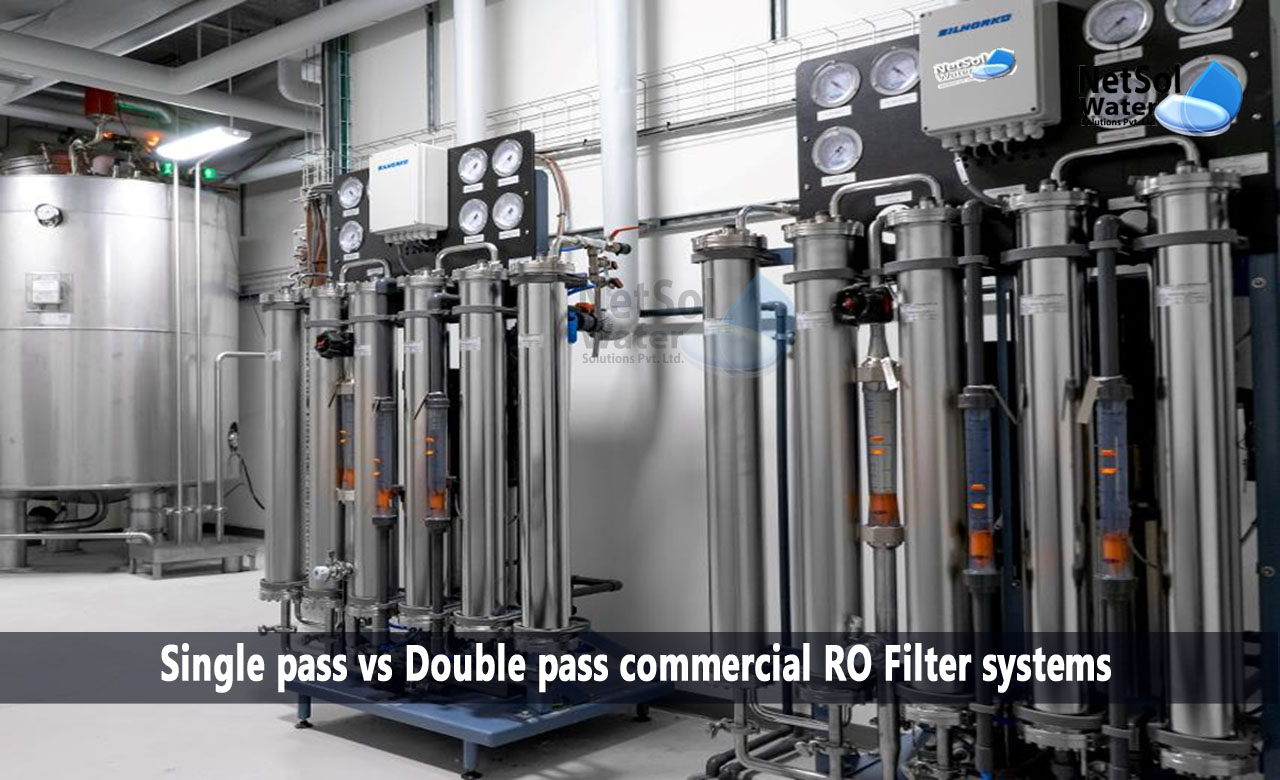A RO is a type of water filtration system that is used all over the world in residential, commercial, and industrial settings. This technology provides us with potable, delicious, and filtered water. It has also become a necessary component of daily life as a healthier alternative. Ro treated water is favored over tap water as a beverage. However, RO has a drawback because its permeate is typically wasted. A double pass RO system is utilized to lessen waste.
Single pass vs Double pass commercial RO Filter systems:
In reverse osmosis (RO) systems, a "pass" refers to the number of times the feed water is processed through the RO membrane. Single pass and double pass are two configurations of commercial reverse osmosis (RO) filter systems. Here's how they differ:
1. Single pass RO system: In a single pass RO system, the feed water is treated once, and the resulting permeate water and reject water are separated. This configuration is typically used for applications where high-quality treated water is needed but wastewater is not a concern, such as in industrial or agricultural settings.
2. Double pass RO system: In a double pass RO system, the feed water is treated twice. The first pass removes a significant portion of the impurities, and the second pass further refines the water quality. The resulting permeate water is of even higher quality than that produced by a single pass system, but at the expense of a higher wastewater flow rate. Double pass RO systems are typically used for applications where very high-quality treated water is required, such as in the pharmaceutical, food, and beverage industries.
Applications of single-pass and double-pass RO systems:
Single pass RO systems are suitable for applications where high-quality purified water is required, but wastewater production is not a significant concern. Some examples of applications that can use a single pass RO system include:
· Drinking water treatment: Single pass RO systems are commonly used to treat water for drinking purposes, such as in homes, offices, or other buildings.
· Aquariums and fish farms: Single pass RO systems are used to produce high-quality water for aquariums and fish farms.
· Agriculture: Single pass RO systems can be used to treat irrigation water, which can improve crop yields and reduce soil salinity.
On the other hand, double pass RO systems are typically used in applications that require very high-quality water, such as in the pharmaceutical or electronics industries, where low levels of dissolved solids are essential. Some examples of applications that can use a double pass RO system include:
· Pharmaceutical manufacturing: Double pass RO systems are commonly used in pharmaceutical manufacturing to produce ultra-pure water that meets stringent quality standards.
· Electronics manufacturing: Double pass RO systems can be used to produce high-quality water for electronics manufacturing processes, such as for cleaning or rinsing.
· Food and beverage production: Double pass RO systems can be used to produce water that meets specific quality standards for food and beverage production, such as for brewing beer or bottling water.
Conclusion:
The number of passes needed in an RO system depends on the specific water quality requirements and application. In general, single pass RO systems are suitable for applications where high-quality purified water is required, but wastewater production is not a significant concern. The main advantages of a double pass RO system are that it can produce higher quality treated water and reduce the need for additional polishing treatments such as deionization or ultraviolet disinfection. However, it can also be more expensive due to the need for additional membrane elements and higher wastewater production. The choice between a single pass and double pass RO system will depend on the specific water quality requirements and operational goals of the user.
Do you need an advice or assistance on selecting the best water and waste water treatment unit? We have solutions for all your problems!
Let us now your problem, our experts will make sure that it goes away.
For an assistance or related query,
Call on +91-965-060-8473
Or write us at enquiry@netsolwater.com



